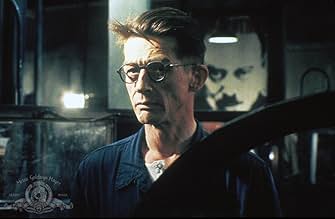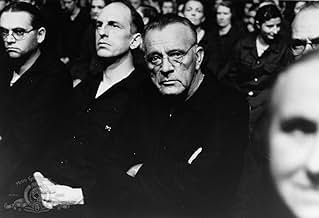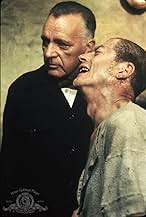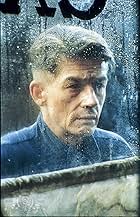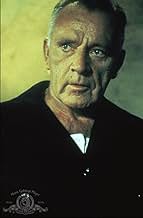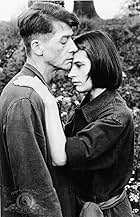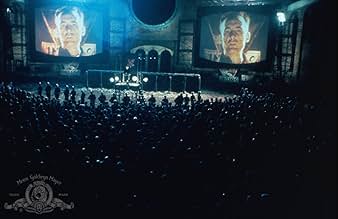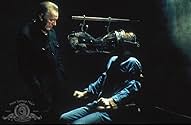Uma sociedade com um futuro totalitário, um homem cujo trabalho diário é reescrever a história, tenta se revoltar apaixonando-se.Uma sociedade com um futuro totalitário, um homem cujo trabalho diário é reescrever a história, tenta se revoltar apaixonando-se.Uma sociedade com um futuro totalitário, um homem cujo trabalho diário é reescrever a história, tenta se revoltar apaixonando-se.
- Indicado para 1 prêmio BAFTA
- 6 vitórias e 3 indicações no total
- Direção
- Roteiristas
- Elenco e equipe completos
- Produção, bilheteria e muito mais no IMDbPro
Enredo
Você sabia?
- CuriosidadesIn poor health during most of the filming, Richard Burton had great difficulty remembering his lines and sometimes had to film a scene dozens of times before he could get it right. The scene in O'Brien's apartment where he is talking to Winston about Goldstein's book took a record of forty-one takes for Burton to say his speech without fumbling his lines.
- Erros de gravaçãoWinston reads a newspaper article titled "INSOC IN RELATION TO CHESS BROTHER WINS." The party name should be spelled "INGSOC."
- Citações
Winston Smith: [reads from Goldstein's book] "In accordance to the principles of Doublethink, it does not matter if the war is not real, or when it is, that victory is not possible. The war is not meant to be won. It is meant to be continuous. The essential act of modern warfare is the destruction of the produce of human labor. A hierarchical society is only possible on the basis of poverty and ignorance. In principle, the war effort is always planned to keep society on the brink of starvation. The war is waged by the ruling group against its own subjects. And its object is not victory over Eurasia or Eastasia, but to keep the very structure of society intact." Julia? Are you awake? There is truth, and there is untruth. To be in a minority of one doesn't make you mad.
- Cenas durante ou pós-créditosThe movie begins with the title, "Who controls the past controls the future. Who controls the present controls the past."
- Versões alternativasFrom director of photography Roger Deakins: "Be careful which '1984' you watch as some do not have the 'Bleach Bypass' effect built in. As the effect was done on all the prints, the IP and subsequent INs do not reflect the intended look of the film."
- ConexõesFeatured in Eurythmics: Sexcrime (Nineteen Eighty-Four) (1984)
- Trilhas sonorasOceania,'Tis For Thee
Music by Dominic Muldowney
Lyrics by Jonathan Gems
Sung by the London Voices, directed by Terry Edwards
Soprano soloist: Sally Mates
Contralto soloist: Linda Hirst
Conducted by Dominic Muldowney
The film was obviously a labor of love for director Michael Radford, who also co-wrote the screenplay. As noted in the end credits, the film "was photographed in and around London during the period April-June 1984, the exact time and setting imagined by the author". If this were a big-budget Hollywood bomb, I might consider that a publicity stunt, but in the case of this little-known, little-seen British film, it's fairly obviously a form of homage.
The look of the film is extraordinary in its evocation of the world Orwell created, down to the tiniest detail. Although that world was obviously very different from the real world of 1984, a deliberate choice was made to stick with the Orwellian vision in every way, anachronistic technology and all, and I firmly believe it was the right choice, as opposed to the "updating" we sometimes see in adaptations of classic "futuristic" stories. Thus, we are treated to the baroque and slightly disorienting sight of black rotary-dial telephones, pneumatic document-delivery systems, old-fashioned "safety razors", tube radios, etc., all of which were already obsolete at the time of filming. And of course, the omnipresent black-and-white "telescreens" with rounded picture tubes.
As Winston Smith, the story's protagonist, John Hurt is an inspired piece of casting; absolutely the perfect choice. Not only does he fit the author's description of Smith to a "T", but with the haircut he's given, he even bears a striking resemblance to Orwell himself. And there is no actor alive better than Hurt at evoking victimization in all its infinite gradations and variations. Suzanna Hamilton, relatively little-known here in the US, also does a fine job as Julia. The film also contains the final film appearance of Richard Burton, in one of his most fascinating and disturbing performances as O'Brien. And the great Cyril Cusack does a classic turn as Charrington, the pawnshop proprietor.
Right from the opening scene, in which we look in on a screening of a short propaganda film, brilliantly conceived and executed by Radford, during the daily "two minutes hate", climaxing in Dominic Muldowney's memorable, genuinely stirring national anthem of Oceania played behind the gigantic image of Big Brother, we are catapulted headlong into Orwell's nightmare vision. While not a particularly long novel (my copy is 256 pages), it is nevertheless dense with ideas, and it would be impossible for a standard-length film to include them all, even if the audience could stand all the endless talking heads it would require. Given the inherent limitations, I think the film largely succeeds in preserving a good portion of the ideological "meat" of the novel. It is certainly extremely faithful in the material it does include. Even the incidental music by Eurythmics feels entirely appropriate, and doesn't in any way break the mood. In fact, it even enhances it.
While I thought the 1956 version did a fairly good job for the time, it had a number of flaws in my estimation that made it far less successful an adaptation. For one thing, although the world it portrays is grim, it's not nearly grim enough. Also, Edmond O'Brien may have done a creditable job as Smith, but physically he's all wrong for the part. The portly, even chubby O'Brien bears little resemblance to the slight, emaciated, chronically exhausted, varicose-ulcerated Smith described in the novel. Neither is the 1956 version as faithful to the book; some of the material is softened, and there are odd, unexplainable alterations: O'Brien becomes O'Connor, and I don't think that Goldstein, the possibly imaginary leader of the possibly fictitious "Resistance", is even mentioned. At 90 minutes, it runs a good 23 minutes shorter than the later version, which necessitates the trimming of even more of the novel, for all you literary purists. In all, for me, the 1984 version of "Nineteen Eighty Four" is the definitive version; a remarkably vivid and memorable film.
- hojoe
- 24 de dez. de 1998
- Link permanente
Principais escolhas
Detalhes
- Data de lançamento
- Países de origem
- Idioma
- Também conhecido como
- Neunzehnhundertvierundachtzig
- Locações de filme
- Empresas de produção
- Consulte mais créditos da empresa na IMDbPro
Bilheteria
- Orçamento
- £ 3.000.000 (estimativa)
- Faturamento bruto nos EUA e Canadá
- US$ 8.430.492
- Fim de semana de estreia nos EUA e Canadá
- US$ 29.897
- 16 de dez. de 1984
- Faturamento bruto mundial
- US$ 8.431.544
Contribua para esta página



